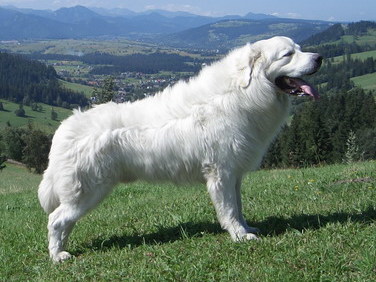The Polish Tatra Sheepdog is a working breed, recognized by the UKC in the United States and by the FCI abroad. One of the “big white dog” breeds, this is a rare livestock guardian that is also able to double as a herder of livestock. Their guarding duty is their primary purpose however, and although they don’t outright attack predators under most circumstances, they will stand their ground against any threats to their charges. As they will also do the same for their human owners, they have been praised for their abilities as companion animals which provide an additional sense of protection. It comes as no surprise that they get along naturally with livestock and other animals, however they also tend to do well with other dogs as well.
Tatras have independent and strong-willed personalities although are very intelligent. They do their guarding job without much training. This is a natural instinct and their temperaments reflects the qualities needed to do this specific job. Independence and decision-making skills are necessary in order to watch over a flock, although can also make them more difficult to train in obedience. Even still, because of their large size and territorial natures they absolutely need to be given obedience training so that an owner can maintain control! Once trained, they can be hard workers – with members of the breed even fulfilling such duties as military and police work, guide dogs, and as carting dogs.
The Polish Tatra was bred to work outdoors, and as such is one of the few breeds which can be kept outside if his needs are otherwise met. As a highly territorial dog, expect him to regularly patrol the backyard and stay alert to the comings and goings of people onto the property day or night! This may include plenty of barking depending upon the number of activities happening around the property. His thick coat makes him particularly suited to colder temperatures, although he should always have a structure to get out of rain or snow. He can also fare well in hot climates although does better overall in places that are cooler. This all said, it is absolutely ok for him to live indoors as well – and he tends to adapt very well to family life! 
Tatra Sheepdogs are gentle with children of the family although do need to be treated with respect. They form very strong bonds with the whole family and tend to look at them as “their flock” to watch over. Although they don’t tend to like strangers as a rule, they must be taught to be respectful towards them – and this is where socialization comes in. They need to be socialized with people of all ages starting from puppyhood and continuing throughout their lives! The proper temperament of a well-bred, well-socialized Tatra is a dog who will bark at strangers but otherwise keep his teeth to himself… unless his family (or other charge) is threatened. A dog which has not been socialized is more likely to bite first and ask questions later – a liability that nobody wants!
The Tatra needs a decent size property to roam in and is not a good choice for those who live in apartments. Although he is fairly inactive inside the house, he does require regular exercise outdoors and this has historically been in the form of patrolling a large property. As he is prone to wandering, the yard absolutely needs to include a fence! It is worth noting that puppies and adolescents are more active in the home, so people that plan to keep this breed indoors shouldn’t expect a laid-back animal for a couple of years. Along with plenty of backyard roaming, he should also be given a long walk every day.
Polish Tatras live an average of 10-12 years which is not unusual for dogs of this size. The breed has an open stud book which means breeding isn’t as strict as with other breeds and any dog which is “typical” of a Tatra can be allowed to be added to the gene pool. This is important for health as it prevents the already small gene pool from becoming even smaller. Health is important in any breed, but especially important in a working dog that was expected to guard large mountainous plots of land, and do so on a minimal diet. This hard worker has a naturally strong and powerful frame, and is known for his stamina and work ethic.
